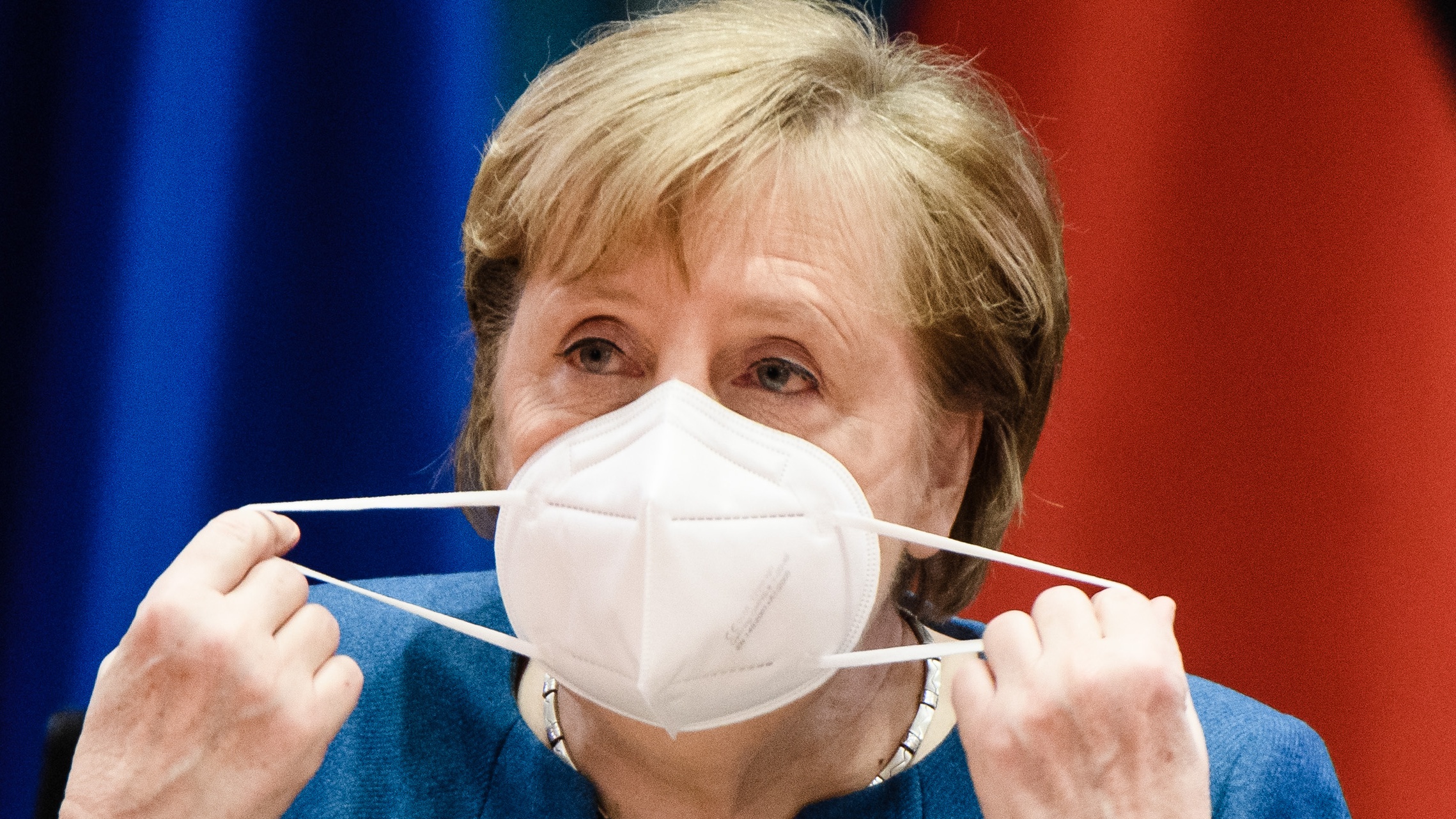Angela Merkel in talks to bring Russian Covid-19 vaccine to EU
German chancellor and Vladimir Putin discuss joint production of jab as criticism of Berlin’s vaccinations rollout intensifies

A free daily email with the biggest news stories of the day – and the best features from TheWeek.com
You are now subscribed
Your newsletter sign-up was successful
Angela Merkel has told Vladimir Putin that she is “open to the idea” of producing Russia’s Sputnik V vaccine in the EU as part of efforts to tackle widespread shortages across the continent.
Following talks between the German chancellor and Russian president, the Kremlin issued a statement saying that “issues of cooperation in combating the coronavirus pandemic were discussed, with an emphasis on possible prospects for joint production of vaccines”, Politico reports.
A spokesperson for Merkel confirmed that the chancellor had told Putin “that she is open to the idea of bilateral cooperation for the purpose of tapping European production capacities [for the Russian vaccine]”. The spokesperson added that the proposal was dependent on the European Medicines Agency giving its approval to the Sputnik V vaccine.
The Week
Escape your echo chamber. Get the facts behind the news, plus analysis from multiple perspectives.

Sign up for The Week's Free Newsletters
From our morning news briefing to a weekly Good News Newsletter, get the best of The Week delivered directly to your inbox.
From our morning news briefing to a weekly Good News Newsletter, get the best of The Week delivered directly to your inbox.
The talks, conducted by phone on Tuesday, come amid allegations that Germany has “bungled” the rollout of a Covid-19 vaccine, says Bloomberg.
Among those who have challenged Merkel’s strategy of ceding responsibility for procuring vaccines to the EU is Olaf Scholz, a senior member of the left-wing Social Democratic Party of Germany (SPD) and potential candidate for chancellor in September’s elections.
During a tense cabinet meeting, Scholz “presented Jens Spahn, the health minister and a member of Mrs Merkel’s Christian Democrats (CDU), with a four-page list of questions about his handling of the affair”, The Telegraph reports.
“This is about a very serious issue, whether we can properly protect the citizens of this country,” Scholz later told German television.
A free daily email with the biggest news stories of the day – and the best features from TheWeek.com
The row is a “clear signal that political manoeuvring has begun” ahead of federal elections later this year, says the newspaper. “But it is also a sign that the fall-out from the vaccine debacle threatens to engulf Mrs Merkel, who until now has been widely praised for her response to the virus.”
A total of 5.3 million doses of the Pfizer/BioNTech vaccine are due to be delivered to Germany by mid-February, with a further 667,000 doses due every week from the end of January.
However, this tally would still leave Germany far short of the number of doses needed to vaccinate the population, amid rising infection rates and deaths.
Chas Newkey-Burden has been part of The Week Digital team for more than a decade and a journalist for 25 years, starting out on the irreverent football weekly 90 Minutes, before moving to lifestyle magazines Loaded and Attitude. He was a columnist for The Big Issue and landed a world exclusive with David Beckham that became the weekly magazine’s bestselling issue. He now writes regularly for The Guardian, The Telegraph, The Independent, Metro, FourFourTwo and the i new site. He is also the author of a number of non-fiction books.
-
 The environmental cost of GLP-1s
The environmental cost of GLP-1sThe explainer Producing the drugs is a dirty process
-
 Greenland’s capital becomes ground zero for the country’s diplomatic straits
Greenland’s capital becomes ground zero for the country’s diplomatic straitsIN THE SPOTLIGHT A flurry of new consular activity in Nuuk shows how important Greenland has become to Europeans’ anxiety about American imperialism
-
 ‘This is something that happens all too often’
‘This is something that happens all too often’Instant Opinion Opinion, comment and editorials of the day
-
 A Nipah virus outbreak in India has brought back Covid-era surveillance
A Nipah virus outbreak in India has brought back Covid-era surveillanceUnder the radar The disease can spread through animals and humans
-
 Covid-19 mRNA vaccines could help fight cancer
Covid-19 mRNA vaccines could help fight cancerUnder the radar They boost the immune system
-
 The new Stratus Covid strain – and why it’s on the rise
The new Stratus Covid strain – and why it’s on the riseThe Explainer ‘No evidence’ new variant is more dangerous or that vaccines won’t work against it, say UK health experts
-
 RFK Jr. vaccine panel advises restricting MMRV shot
RFK Jr. vaccine panel advises restricting MMRV shotSpeed Read The committee voted to restrict access to a childhood vaccine against chickenpox
-
 RFK Jr. scraps Covid shots for pregnant women, kids
RFK Jr. scraps Covid shots for pregnant women, kidsSpeed Read The Health Secretary announced a policy change without informing CDC officials
-
 New FDA chiefs limit Covid-19 shots to elderly, sick
New FDA chiefs limit Covid-19 shots to elderly, sickspeed read The FDA set stricter approval standards for booster shots
-
 RFK Jr.: A new plan for sabotaging vaccines
RFK Jr.: A new plan for sabotaging vaccinesFeature The Health Secretary announced changes to vaccine testing and asks Americans to 'do your own research'
-
 Five years on: How Covid changed everything
Five years on: How Covid changed everythingFeature We seem to have collectively forgotten Covid’s horrors, but they have completely reshaped politics